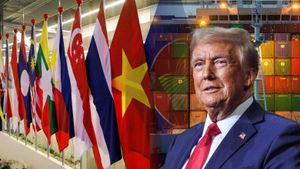The U.S. Treasury Department has recently taken decisive action against members of the Gulf Cartel, imposing sanctions due to their involvement in illegal fishing operations off the coast of South Padre Island, Texas. This crackdown not only sheds light on the cartel's nefarious activities but also highlights the complex intersection of crime, environmental degradation, and economic exploitation prevalent along the U.S.-Mexico border.
On November 27, 2024, the Treasury announced sanctions targeting several high-ranking cartel operatives, including Francisco Javier Sierra Angulo, known as "El Borrado," the Matamoros plaza boss, along with brothers Ismael Guerra Salinas and Omar Guerra Salinas, who manage fishing operations at Playa Bagdad for the cartel.
Federal authorities described the sanctions as part of efforts to combat the illicit activities tied to fishing, particularly illegal, unreported, and unregulated (IUU) fishing. This illegal fishing has been linked to broader criminal schemes involving human trafficking and drug smuggling, highlighting the depths of organized crime's infiltration of the fishing industry. The statement from the Treasury explained, "Those designated are tied to the Gulf Cartel's involvement in criminal activities associated with IUU fishing, human smuggling, and narcotics trafficking."
Officials reported staggering figures, with the Coast Guard recently seizing 2,200 pounds of illegally caught red snapper just off the South Padre Island coast. Authorities are concerned not just about the illegal fishing itself but about the methods used, which often include crossing illegally from Mexican waters to exploit the more abundant marine species within U.S. territory, particularly red snapper and shark.
U.S. fishing regulations maintain strict limits on these species, thereby increasing the incentive for illegal captures by Mexican fishermen. According to the announcement, "Mexican fishermen cross over to fish via lanchas, lightweight boats primarily used for both fishing and the transport of drugs and people across the border." This dual use of fishing vessels complicates efforts to control the border and enforce fishing regulations, as these operatives move between legal and illegal pursuits seamlessly.
The sanctions serve to bar these individuals from accessing any property or assets within U.S. jurisdiction, indicating the U.S. government’s intent to disrupt the financial lifelines enabling such operations. Financial assets tied to the cartel’s fishing activities are also now subject to seizure, restricting their capacity for continuation and expansion.
Crucially, the Gulf Cartel's fishing operations at Playa Bagdad are not isolated instances of illegal activity; they represent part of a larger narrative involving exploitative practices on marine resources which are particularly vulnerable to such criminal elements. "IUU fishing often involves criminal activity, forced labor, and human rights abuses, and is often a revenue stream for criminal organizations," the release stated. This exploitation goes beyond direct fishing practices, encompassing environmental impacts, labor violations, and cross-border crime.
Officials noted the cartel's interconnectedness to various components of the illegal economy, with the proceeds from illegal fishing augmenting revenues collected from drug trafficking and human smuggling operations. "Criminal organizations like the Gulf Cartel rely on diverse illicit schemes like IUU fishing to fund their operations," commented Bradley T. Smith, the Treasury Department's acting undersecretary for terrorism and financial intelligence. This multi-faceted approach to crime allows cartels to mitigate risks and maximize profits across various illegal avenues.
The U.S. Coast Guard and Department of Homeland Security are actively engaged with monitoring and interceding against these IUU practices, recognizing the serious threat they pose not only to local fishing communities but to the broader ecological health of the Gulf of Mexico as well. The recurring interceptions of Mexican lanchas demonstrate the urgent need for increased vigilance and cooperation to mitigate these illegal operations along the coastline.
This situation is emblematic of greater challenges along the U.S.-Mexico border, where illegal activities spanning numerous sectors create complex dilemmas for enforcement. The National Oceanic and Atmospheric Administration (NOAA) previously instituted restrictions against Mexican fishing vessels due to chronic noncompliance. These regulations remain enforced, signaling the serious repercussions of unchecked illegal fishing.
The illicit fishing practices of the Gulf Cartel follow longstanding trends seen across other regions as well. Notably, other cartel activities have devastated local biodiversity, as seen with totoaba fishing leading to grave threats against the vaquita, the world's most endangered marine mammal.
This sets the stage for the broader challenges of illegal activities on both sides of the border, highlighting the importance of binational cooperation to address illegal fishing and its significant environmental impacts. With the Gulf Cartel engaged extensively across various illegal markets, enforcement agencies are increasingly pressed to act decisively to dismantle these operations, which are fundamentally threatening to marine ecosystems and sustainable practices.
Overall, the Treasury’s sanctions against the Gulf Cartel members signal the U.S. government's commitment to tackling intertwining issues of crime and ecological preservation during this era fraught with unique challenges. The need for governmental and community-level cooperation has never been greater as authorities continue to shine light on the shadows cast by organized crime over cherished marine resources.



